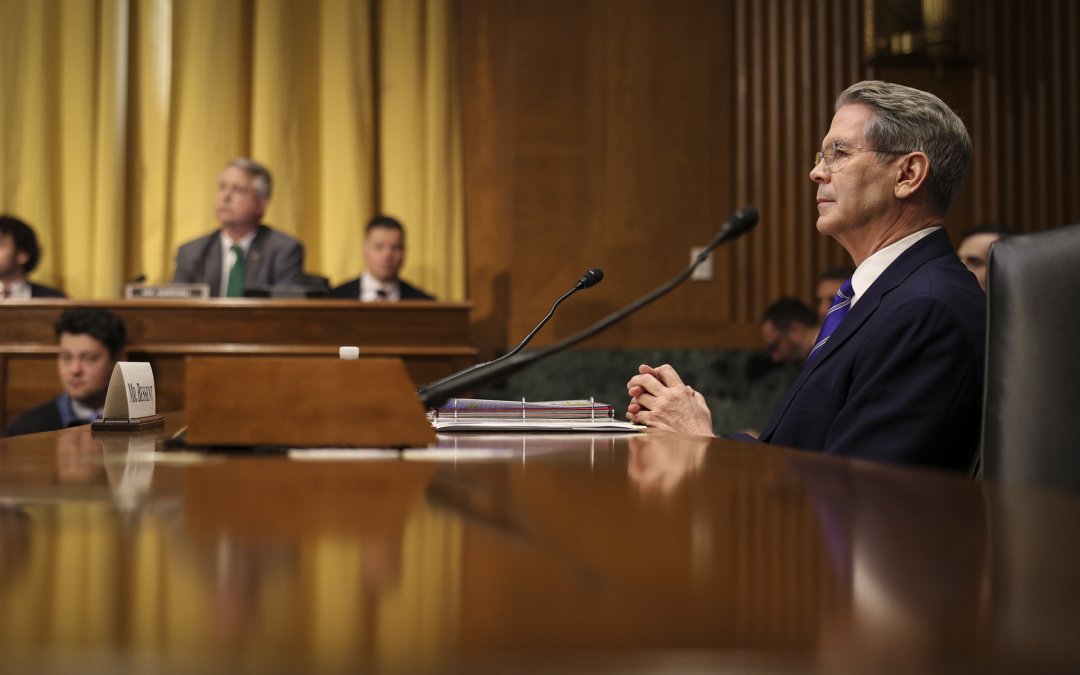WASHINGTON–Treasury Secretary nominee Scott Bessent started his confirmation hearing testimony Thursday by recounting growing up with financial hardships in Little River, South Carolina.
“My life has been an only-in-America story that I am determined to preserve for future generations,” he said.
Senate Democrats, however, fixated on Bessent’s more recent past, as the now-wealthy Wall Street investor took the stand in front of the Senate Finance Committee. Bessent previously worked for George Soros, a hedge fund mogul and key donor for Democrats, and eventually became his fund’s chief investment officer. Bessent later went on to start the investment firm Key Square Capital Management.
Democrats focused much of their questions on Bessent’s beliefs on tariffs, tax cuts for the wealthiest Americans and government spending.
If Bessent is confirmed as secretary of the Treasury, he would be a key figure in carrying out President-elect Donald Trump’s second-term economic agenda. He would serve as the chief financial officer for the U.S. government, responsible for advising the president and his cabinet on domestic and global economic and tax policy. He would be instrumental in determining U.S. fiscal policy – giving Bessent a key voice in the national debt and tariffs debate.
Bessent, throughout the hearing, underscored his desire to extend the tax cuts from the Tax Cuts and Jobs Act. He stated, in a response to Sen. Raphael Warnock (D-Ga.), that “there’s no income level” that should have tax cuts discontinued.
Several Democrats, during the hearing, stressed that these tax cuts served the wealthiest Americans most.
Bessent argued that the tax cuts would be paid for with economic growth they sparked and cutting unnecessary spending.
Sen. Michael Bennet (D-Colo.) disputed that the tax cuts would pay for themselves, “While the benefit went to the richest people in America, the cost is being borne by the children of working people all over this country.”
GOP senators mainly used their questions to establish support for the nominee. They did not bring up Bessent’s past campaign contributions to prominent Democrats, including Barack Obama’s presidential run and Hillary Clinton’s campaign for Senate. The vast majority of Bessent’s political contributions were to Republican political action committees in the past three years, according to data from the Federal Election Commission. He gave nearly $4 million to Republican groups since the start of 2022.
However, Sen. Todd Young (R-Ind.) asked pointed questions about how Bessent would act as the chair of the Committee on Foreign Investment in the U.S., which is a committee that reviews foreign investments.
Young pressed Bessent if he would commit to an “impartial review” of the Nippon Steel acquisition of U.S. Steel if it reappeared before the committee.
Bessent initially echoed Trump’s statement he, like President Joe Biden, would have also blocked the deal. After pushback from Young, Bessent affirmed the committee would conduct an impartial review of the deal if it is reopened.
Democrats also repeatedly brought up concerns about Trump’s plan to impose widespread tariffs. Ranking Member Sen. Ron Wyden (D-Ore.) claimed the implementation of tariffs would hurt small businesses and working families “with additional taxes on practically everything.”
During the hearing, Bessent disputed the notion that tariffs would be a burden on small businesses and working families. He advocated for tariffs by outlining three benefits: a tool to remedy unfair trade practices, a revenue raiser and leverage for negotiations.
During his testimony, Bessent repeatedly said he would seek to cut spending. He stated that the U.S. had a spending problem, not a revenue problem. While Bessent pledged not to touch Social Security during the hearing, Democrats expressed concerns that a reduction in spending would hurt programs such as Medicaid.
Bessent is on a likely path to confirmation with no Republican senator signaling during the hearing they will vote against him. However, many Democratic senators still seemed cynical of the nominee due to his wealth and his policy promises.
“In a Trump economy, the winner circle is small and it is dominated by the ultra-wealthy,” Wyden said. “Trump and his advisors are indifferent to the problems (working people) face.”

